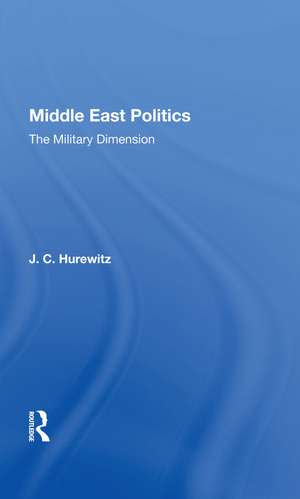Middle East Politics: The Military Dimension
Autor J. C. Hurewitzen Limba Engleză Hardback – 7 iun 2019
Preț: 764.20 lei
Preț vechi: 1102.79 lei
-31% Nou
Puncte Express: 1146
Preț estimativ în valută:
146.28€ • 158.94$ • 122.95£
146.28€ • 158.94$ • 122.95£
Carte tipărită la comandă
Livrare economică 21 aprilie-05 mai
Preluare comenzi: 021 569.72.76
Specificații
ISBN-13: 9780367020903
ISBN-10: 0367020904
Pagini: 568
Dimensiuni: 136 x 220 mm
Greutate: 0.45 kg
Ediția:1
Editura: Taylor & Francis
Colecția Routledge
Locul publicării:Oxford, United Kingdom
ISBN-10: 0367020904
Pagini: 568
Dimensiuni: 136 x 220 mm
Greutate: 0.45 kg
Ediția:1
Editura: Taylor & Francis
Colecția Routledge
Locul publicării:Oxford, United Kingdom
Cuprins
Preface -- American Entanglement in Three-Dimensional Politics -- Legacies -- The Islamic Tradition* -- The Beginnings of Military Modernization* -- European Imperial Styles -- Postwar Politics -- Military Politics and the Lingering Cold War -- Armies in Postwar Politics -- Military Republics -- Egypt: Military Rule in a Rapidly Changing Society -- Military Roulette: Syria and Iraq -- Sudan: Military Interruption of Civilian Rule -- Military-Civilian Coalitions -- Junior Partners: Pakistan and Algeria -- Concealed Partners: Pakistan and Turkey -- Traditional Monarchies -- Libya: Triumph of Sanusi Leadership -- Saudi Arabia: The Peninsula Under Najdi Rule -- Yemen: Test of Zaydi Durability -- Modernizing Monarchies -- An American Client: Iran -- Cold War Beneficiary: Afghanistan -- Jordan: Keeping a Nonviable State Alive -- Constitutional Absolutism: Morocco -- Kuwayt: An Affluent Amirate under Political Siege -- Non-military Republics -- Garrison Democracy: Israel* -- Confessional Democracy: Lebanon* -- Tunisia: Stable One-Party System -- Regional Consequences -- Armies as Agencies of Social Change -- Arms Races in the Region -- Races in the Arab-Israel Zone -- Changing Military Politics and United States Options -- Bibliographic Note
Descriere
The Arab-Israel Six Day War in June 1967 riveted world attention on the huge quantities of sophisticated weapons amassed in the arsenals of the Middle East – and left in its wake tangled political-military dilemmas and the intensification of the most dangerous arms race in the nonindustrialized world. How do major upheavals spread across borders so easily in the Middle East? What is the role of the military in the process of modernization? How can the rash of military coups be explained? Why is Israel, the most vigorous democracy in the Middle East, also the most vigorously mobilized and armed nation? J. C. Hurewitz, Professor of Government at Columbia University’s School of International Affairs, believes the answers to these and other pressing questions of Middle Eastern politics can be found only in a thorough examination of civil-military relations in each country, whether it is under military rule or not. The Middle East, as defined in this book, comprises eighteen states, stretching from Morocco to Afghanistan and Pakistan. Probing the role of the military in each state, the author assesses such other factors as the geographical and regional influences on specific national developments. Dominating all are the ramifications of the competing American and Soviet policies for the region. Through his analysis of the cold war tactics of the two Great Powers, and of the bewildering arms races and the confusion of military politics that these tactics have engendered, Professor Hurewitz brings into much clearer perspective the options for the West, and particularly for the United States, in this area. He has provided, in sum, an informative and fully documented study of the whole interplay of domestic, regional, and international politics in the postwar Middle East.
